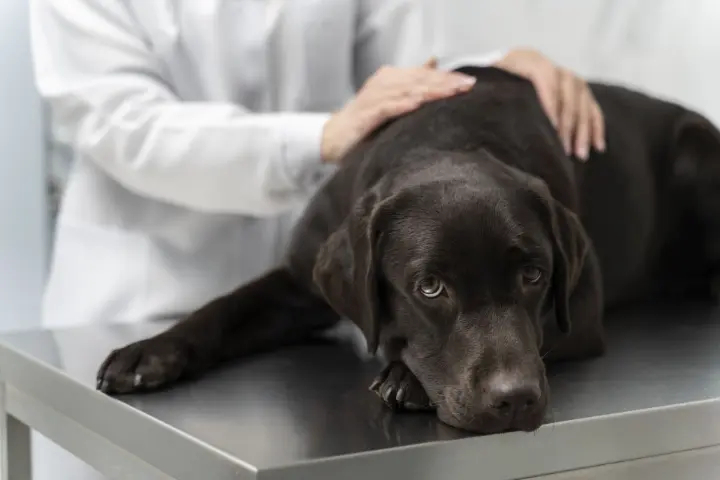If you’ve ever lived with a dog, you’ll know that tummy troubles come with the territory. One day they’re bouncing around with boundless energy, the next they’re curled up with a gurgly stomach and a look that says, “Mum, fix it.”
Loona, our nine-year-old Australian Shepherd, has had more than a few dodgy tums over the years. From sneaky scavenging in the kitchen to picking up something suspect on our walks here in France, I’ve learned to read the signs quickly. Most tummy bugs are minor and pass with a little TLC, but some can be more serious. Knowing the difference can help keep your dog safe and comfortable.
What Causes Tummy Bugs in Dogs?
Tummy upsets in dogs are usually caused by bacteria, viruses, or parasites — but sometimes it’s just plain old mischief. Here are the usual suspects:
- Bacteria: Salmonella, E. coli, and Campylobacter are common offenders, often from contaminated food or water.
- Viruses: Parvovirus and Canine Coronavirus are highly contagious and potentially serious.
- Parasites: Giardia and roundworms lurk in soil, faeces, and standing water.
Other common causes include:
- Dietary indiscretions: Translation: your dog’s been bin-raiding or snaffled something on a walk. Loona is notorious for this — the French countryside seems full of “interesting” things to taste test.
- Sudden food changes: Switching diets too quickly is a classic cause of digestive upset.
- Allergies or underlying health conditions: Ongoing tummy issues may point to food intolerances, inflammatory bowel disease, or something more complex.
Symptoms to Watch Out For
Tummy bugs often look alike, no matter the cause. Keep an eye out for:
- Vomiting
- Diarrhoea
- Loss of appetite
- Lethargy
- Abdominal pain
- Dehydration (dry gums, sunken eyes, skin that doesn’t spring back when pinched)
I’ve become quite the reluctant poop-inspector thanks to Loona — glamorous, I know — but monitoring changes is one of the fastest ways to spot when something’s not right.
Where Dogs Pick Up Bugs on Walks
Our walks in the French countryside are full of joy, but they do come with risks. Dogs can pick up bacteria, viruses, and parasites in all sorts of ways:
- Contaminated soil or water – a quick slurp from a puddle can lead to Giardia or E. coli.
- Contact with other dogs – viruses like Parvovirus spread easily via faeces.
- Hunting instincts – eating rodents or birds can transmit parasites.
- Fleas and ticks – tapeworms and other nasties hitchhike this way.
- Unsupervised snacking – garbage, carcasses, or “mystery finds” are irresistible to many dogs.
Loona has a real talent for discovering things I’d rather she didn’t. Keeping her on a lead in risky areas has saved us more than one emergency vet visit.
Flooded Areas: Seasonal Risks
With autumn here, parts of France are seeing more flooding — and floodwater is a hotbed for tummy bugs. Dogs wading through or drinking from floodwater risk:
- Ingesting sewage, chemicals, and pollutants
- Exposure to bacteria like Salmonella and E. coli
- Higher concentrations of parasites such as Giardia
- Encounters with displaced wildlife carrying diseases
Top tips for safety after floods:
- Avoid flooded areas entirely if you can.
- Always provide clean, fresh drinking water.
- Wash paws and coats after wet walks.
- Stay up to date with vaccinations, worming, and flea/tick preventatives.
Caring for a Dog with an Upset Tummy
Not every poorly stomach needs an emergency trip to the vet. For mild cases:
- Rest the gut: Skip one meal (but never water) to let the stomach settle.
- Offer bland food: Boiled chicken and rice, or a vet-recommended diet.
- Keep hydrated: Add a splash of water or dog-safe electrolyte solution to meals.
- Monitor closely: Track appetite, stools, and energy levels.
I’ve found that keeping Loona calm and comfortable — with plenty of fresh water and a quiet spot to rest — often makes all the difference.

When to Call the Vet
Contact your vet if your dog shows any of the following:
- Vomiting or diarrhea lasting more than 24–48 hours
- Blood in vomit or stools
- Severe lethargy or refusal to eat
- Signs of dehydration
- Puppies, older dogs, or those with health conditions showing symptoms
Trust your instincts — if something feels “off,” it’s always safer to get your dog checked. Loona’s occasional tummy wobbles have taught me that a quick call to the vet brings peace of mind, even if it turns out to be nothing serious.
Final Thoughts
Dog tummy troubles are common, but they don’t have to cause panic. By understanding the causes, recognising the symptoms, and knowing when to seek help, you can keep your pup happy and healthy.
Loona may have had her fair share of upset stomachs, but with a mix of prevention, vigilance, and timely care, she’s always bounced back. And honestly? Each episode has reminded me to be more watchful on walks, more careful with leftovers, and more grateful for her resilience.
Because at the end of the day, even a dodgy tummy can’t keep a good dog down for long.